These Homemade Corn Tortillas are still the most popular recipe on the site, so if you're new to them please consider giving it a go! I've updated this post with tips for the most common obstacles you'll encounter when making tortillas for the first time -- plus some brand options if you're new to Masa Harina.
Imagine walking into the grocery store early one morning and seeing this:
That's the dough used to make fresh corn tortillas each morning in the markets of Cozumel.
Producers will de-hydrate this corn dough and sell it in bags like this:
This is Masa Harina and it's your golden ticket to easy homemade corn tortillas!
Add some water, a bit of salt, and you've got masa on your hands -- which means you're only a few minutes away from an authentic stack of tortillas. What exactly is Masa Harina?
Making a batch of these beauties comes with two main benefits, the most obvious being a stack of corn tortillas that are good enough to be eaten on their own.
The other, hidden benefit is that your taste buds will now have a built-in tortillameter that you can use to gauge the quality of tortillas sold in your neighborhood.
This will help you stay away from store-bought tortillas that have strayed too far from the original process.
How To Make Corn Tortillas
First things first, get some Masa Harina in the house!
Here are the three brands that are most common in the States: Bob's Red Mill, Maseca, and Gold Mine.
Maseca is the most common brand and it's a worthy starting point. Lately I prefer the flavor of Bob's Red Mill so keep an eye out for that one too. More info on comparing these Masa Harina brands.
Update: Bob's Red Mill also sells an organic Masa Harina. More details on organic Masa Harina options.
Okay, here's your starting recipe:
2 cups Masa Harina
1.5 cups of warm water
1/2 teaspoon salt
Add the 2 cups of Masa Harina and 1/2 teaspoon salt to a mixing bowl.
Add one cup of the warm water and stir until all of the water is absorbed.
It will probably look like this:
Now start adding the rest of the warm water incrementally, a couple tablespoons at a time, and stirring regularly.
The idea is to keep adding water until the flour bits meld into a dough. At that point you can pick it up with your hands and knead it together.
Eventually it will look like this:
Next, separate the dough into golf ball sized chunks, rolling them between your hands to form a smooth ball.
This will make the tortillas about 4 inches across.
You'll need something to put on either side of the dough ball to prevent it from sticking when you flatten it.
You can use plastic wrap, but I’ve found that a large Ziploc bag cut in half works best:
So that’s half a Ziploc bag on either side of the dough ball.
And after flattening it the plastic should peel off effortlessly. If it’s sticking then there's probably too much water in the dough.
Do I Really Need A Tortilla Press?
No, you definitely don't need a tortilla press, so please don't let that stop you from making your own tortillas!
You can use a skillet or any flat-bottomed dish to squish 'em.
Here I'm using a casserole dish and it's just as effective as a tortilla press. Just be sure to put plastic on either side of the dough ball before flattening it.
How To Cook Your Corn Tortillas
Okay, there are two schools of thought when it comes to cooking the tortillas.
The first simply cooks them on each side for about a minute, or until brown spots start to appear on the underside.
The second school flips the tortilla 10 seconds after putting it on the skillet and then cooks each side for about a minute. The idea is that those first 10 seconds will seal in some of the heat and help the insides cook quicker.
I’ve found the second method makes the tortillas lighter and fluffier, so I use that one. It’s a little bit more work, but I think it’s worth it.
So again...heat the skillet to medium-high heat. Add a tortilla and flip after 10 seconds, then cook each side for about a minute or until brown spots form on each side.
Don’t be surprised if they start to puff up during cooking, that’s a good sign!
You can also try pressing down on them with a spatula once you flip to the final side -- sometimes this will make them puff up instantly!
Eventually, you’ll have a stack of warm, steaming corn tortillas.
They are best eaten as soon as possible. If you want some friends for life feel free to share with neighbors.
Tips For Making Tortillas The First Time
There are two main sources of frustration that you should know about before venturing into tortilla land.
First, getting the consistency of the dough right can take some fiddling.
Ideally, you can handle the dough without it sticking to your hands. If it's sticky then simply add a few sprinklings of Masa Harina to dry it out.
And conversely, if the dough is crumbly and not coming together then it means you are low on water. Simply add splashes of water until it forms a cohesive ball.
That's why I typically recommend adding the final 1/2 cup of water incrementally -- this will help you find the right consistency quicker.
And the second pitfall is the temp of the stove. You might need to make a tortilla sacrifice to get the temperature of the stove right so don't sweat it if this happens!
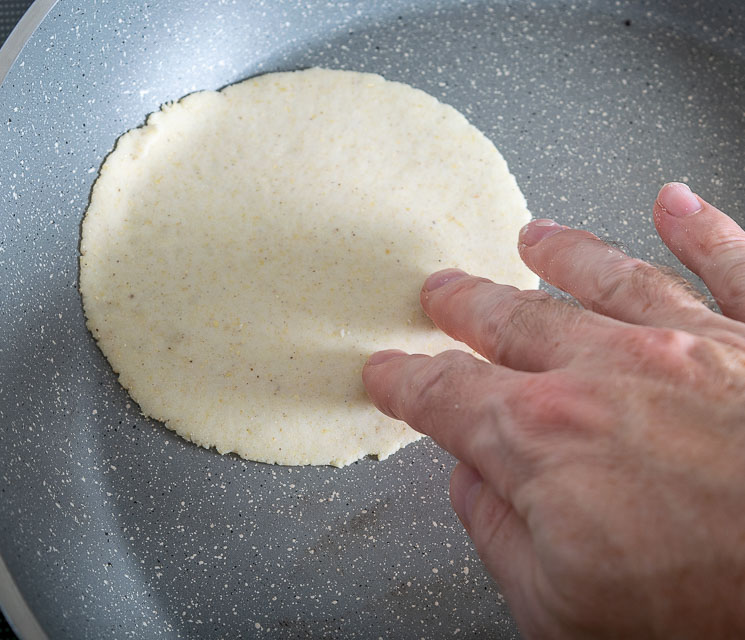
For my stove that means a little over medium heat does the job.
This will have brown spots forming on the underside in about 60 seconds or so. This also makes it easy to flip the tortilla with your fingers as it will be sliding around the pan in a matter of seconds when the temp is right.
If it's taking significantly longer for brown spots to form then you'll need to raise the heat. Conversely, if you're getting black spots forming in a matter of seconds then you need to lower the heat.
How To Store Corn Tortillas
These are best eaten right off the skillet! But you can keep them warm by simply wrapping them in a tea towel or by using a dedicated tortilla warmer.
They'll keep for a few days in the fridge, but don't forget that you'll need to reheat them to bring them back to life after they have chilled down.
I always use a dry skillet over medium heat to do this -- simply add as many tortillas as you need to the skillet and give them 30-60 seconds per side to warm up. Using the stovetop will also crisp them up slightly and that's when they are most tasty.
Can I Freeze The Tortilla Dough?
I haven't tried freezing the masa dough but I 've gotten multiple emails saying it doesn't work! Once thawed the masa dough seems to be crumbly. Sure, you could probably add some water to rebuild it, but it would probably be quicker and tastier to start over.
Instead, I will sometimes use only half of the dough to make tortillas and store the rest of it in the fridge where it will keep for at least a few days.
Simply wrap the leftover dough in plastic and foil, and then store it in the fridge. The next day you can pull off a chunk, flatten it, and cook up a warm, homemade tortilla in a matter of minutes 🙂
Okay, I hope this solves Homemade Corn Tortillas for you! For reference, here are some additional articles on my site to fill in any gaps:
- 3 Different Masa Harina Brands To Choose From
- Organic Masa Harina Options
- What the heck is Nixtamalization?
- Trying out the Masa Harina from Masienda
- Homemade Masa Dough Using Dried Field Corn
- Corn Tortillas Made With Fat
- Masa Harina vs. Cornmeal: What's the Difference?
- Masa Harina Cornbread
- Corn Tortillas Made From Popcorn Kernels
- Half and Half Tortillas (Corn + Flour)
Please use this post as permission to just go for it! Making your own corn tortillas is a massive upgrade for your home kitchen -- plus it will give you an expert tortillameter for life 🙂
Buen Provecho.
Want the latest recipe? Click your favorite from these options and follow me: Instagram, Facebook, Pinterest, TikTok, YouTube.
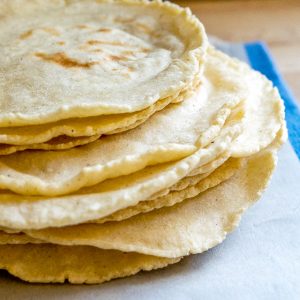
Homemade Corn Tortillas
Ingredients
- 2 cups Masa Harina
- 1/2 teaspoon salt
- 1.5 cups warm water
Instructions
- Add 2 cups Masa Harina and 1/2 teaspoon salt to a mixing bowl. Add 1 cup of the warm water and stir until the water is absorbed. Add the rest of the water incrementally until the flour melds into a dough. Use your hands to knead the dough into a cohesive ball.
- If the dough is sticking to your hands simply add a few sprinklings of Masa Harina to dry it out. Conversely, if the dough is still crumbly then you can add splashes of water until it becomes cohesive.
- Separate the dough into golf ball sized chunks, this will make tortillas approximately 4 inches across.
- Flatten the dough balls using a flat bottomed pan or a tortilla press. Be sure to line each side of the dough ball with plastic or Ziploc pieces. I usually just cut off the top of a gallon sized Ziploc bag and then make slits down the sides, leaving it connected at the bottom.
- Heat a skillet or comal to medium-high heat. (Lately I use a tad over medium heat on my stove and this will have brown spots forming in about 60 seconds.)
- Add a tortilla to the skillet and flip it after 10 seconds. Then cook each side for about a minute or until light brown spots are forming on the underside.
- Continue cooking the rest of the tortillas. I usually put one in the skillet and flatten the next one to expedite the process. Once cooked you can keep them warm by wrapping them in a tea towel or using a dedicated tortilla warmer. Serve immediately.
- Store leftovers tortillas in an airtight container in the fridge. To reheat, cook them in a dry skillet over medium heat until warm and crispy.
Notes
This article we wrote on types of tortillas has a current list of all the tortilla recipes we have on our site, including this one for making corn tortillas from fresh masa dough.
We also just used some Masa Harina to make a batch of Tamales.
And our latest post shows how to make a batch of tortillas from dried White Olotillo Corn.
Wondering which Salsa to make first? Check out this page.
Still hungry?!
Want to receive Mexican Please recipes via email when they are posted? Sign up below to subscribe. All recipes are spam free.


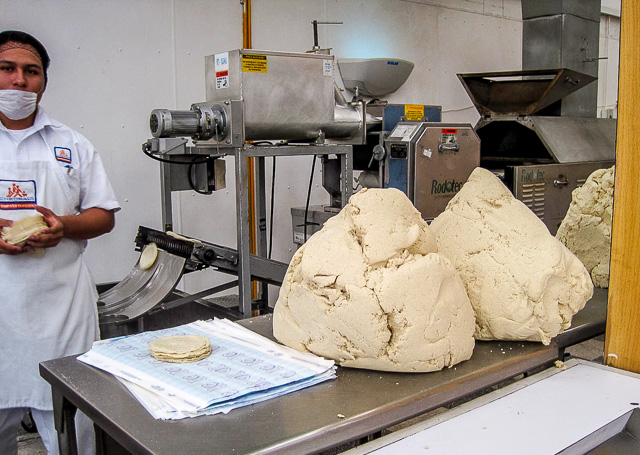
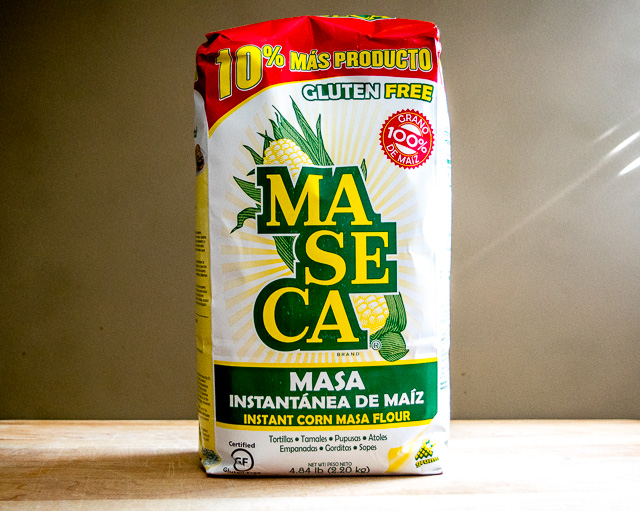
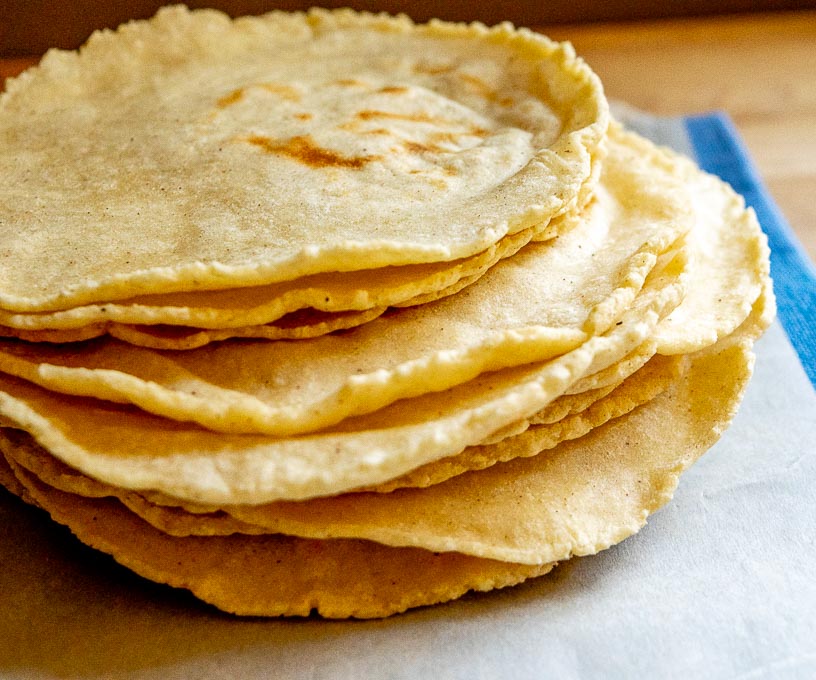
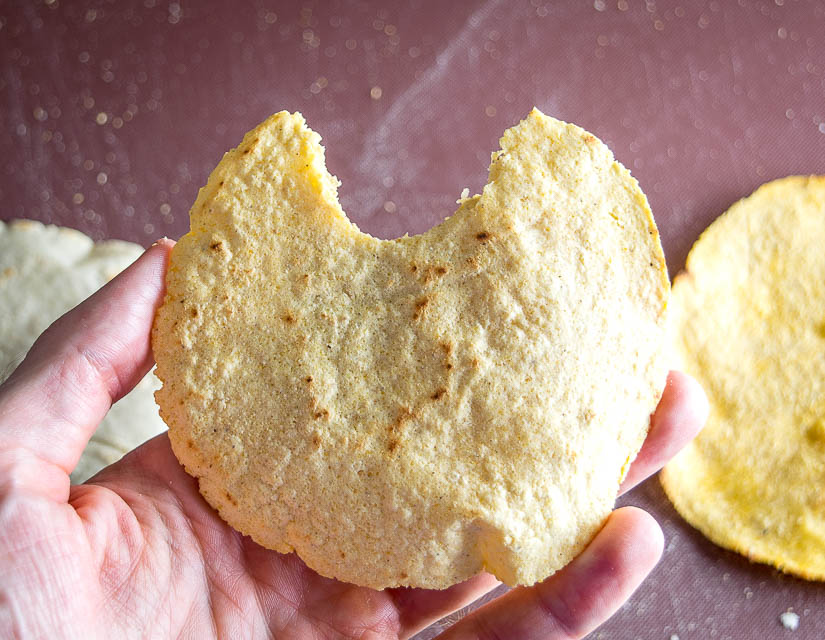
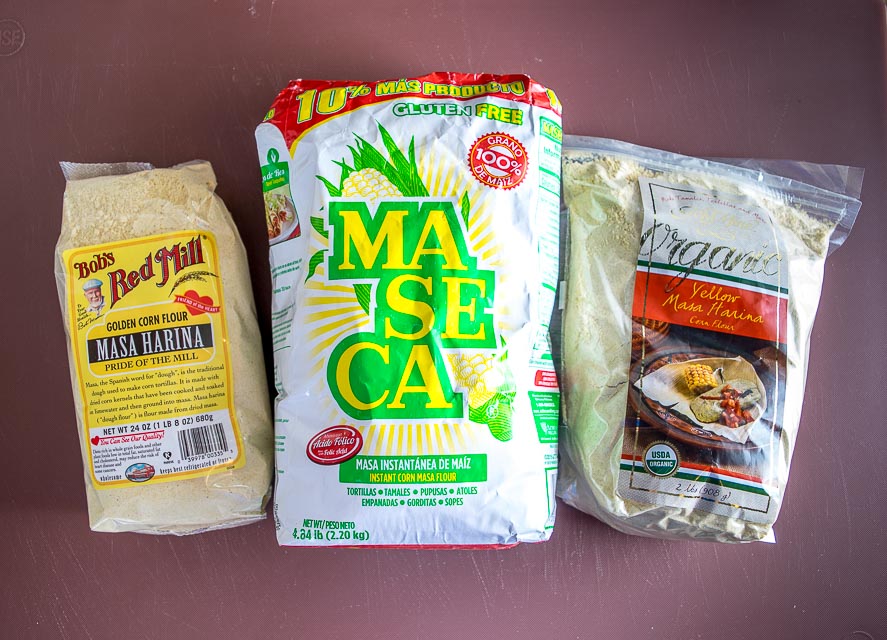
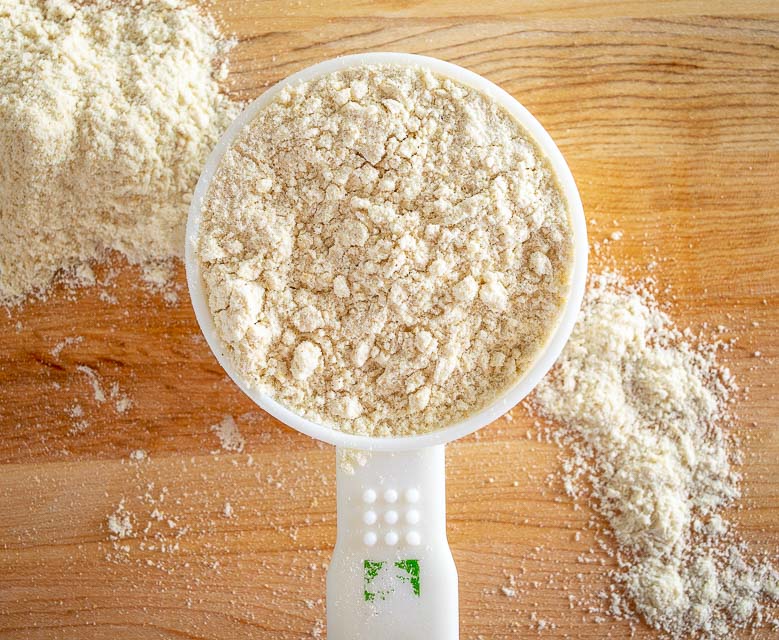
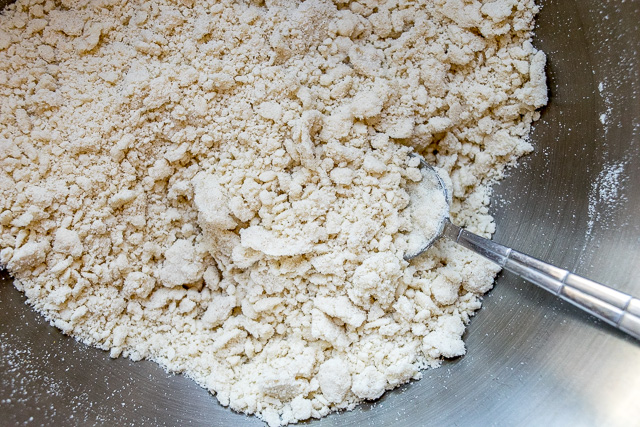
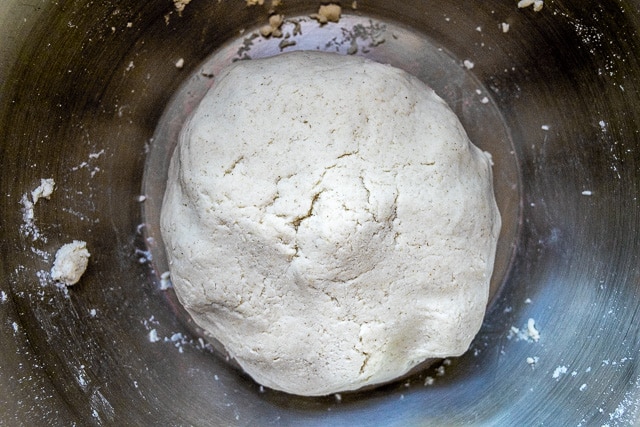
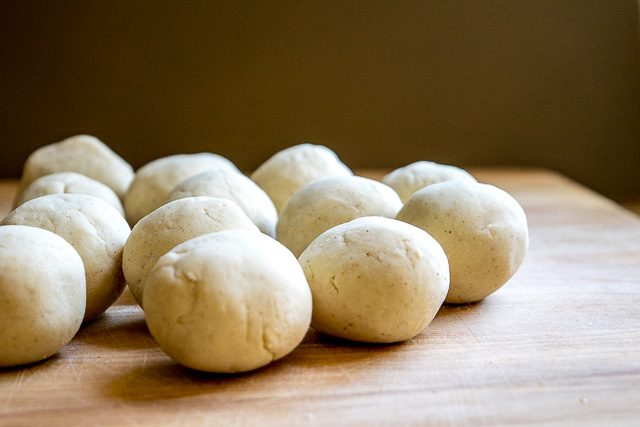
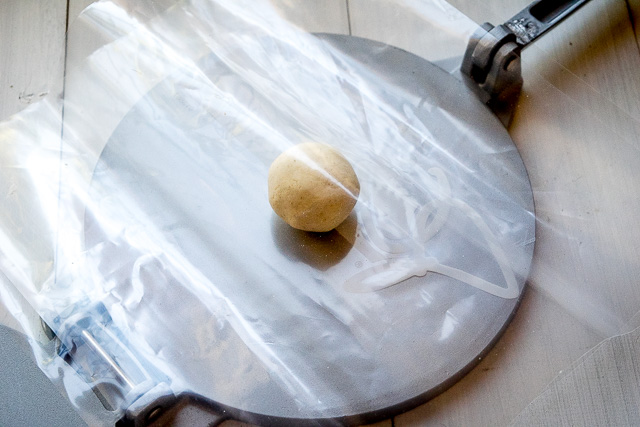
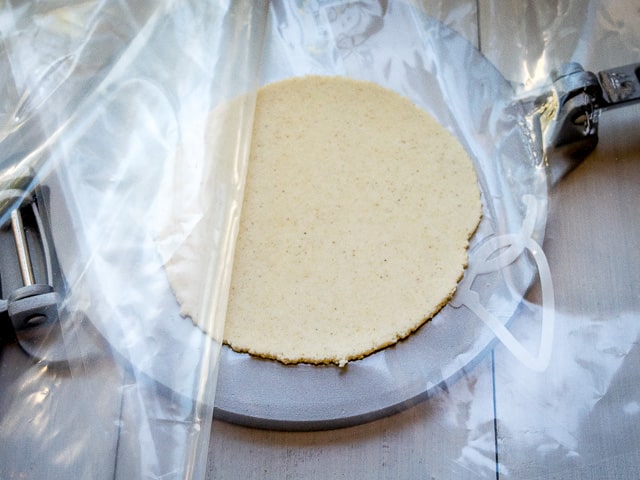
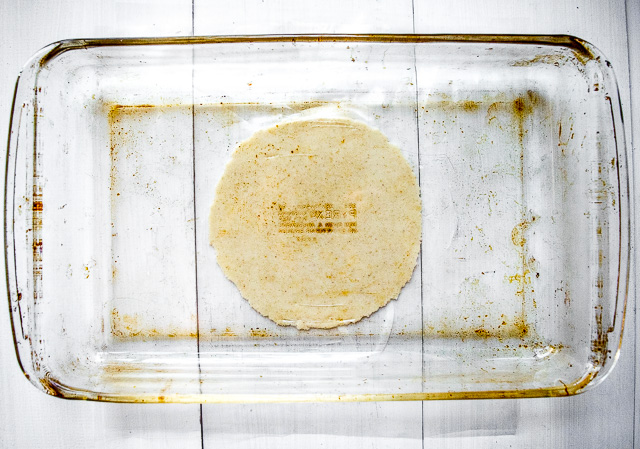
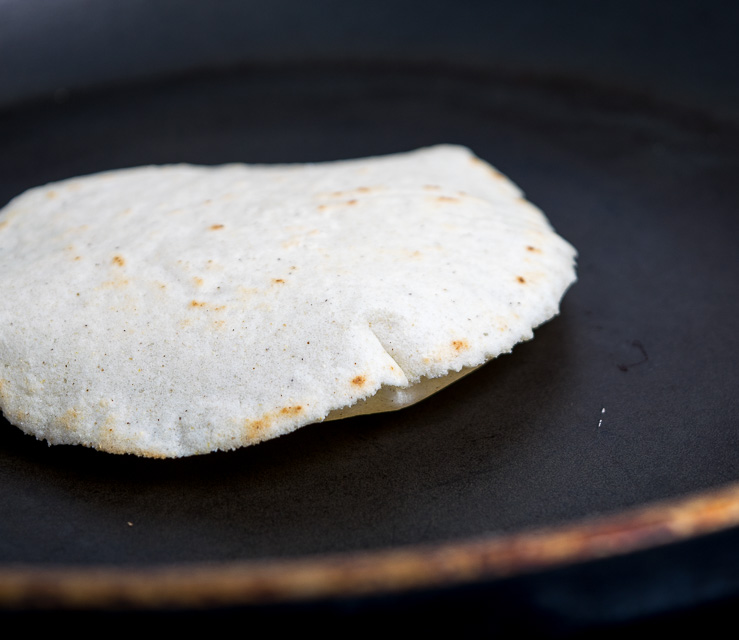
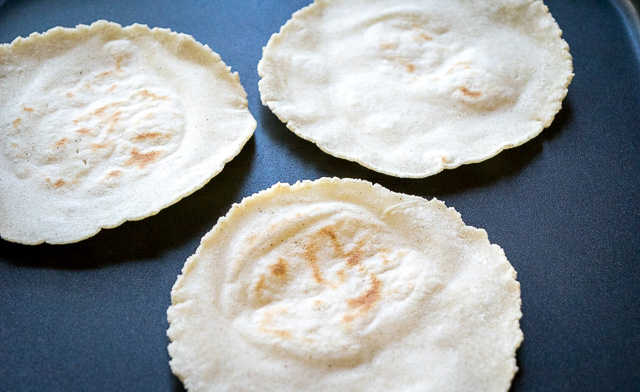
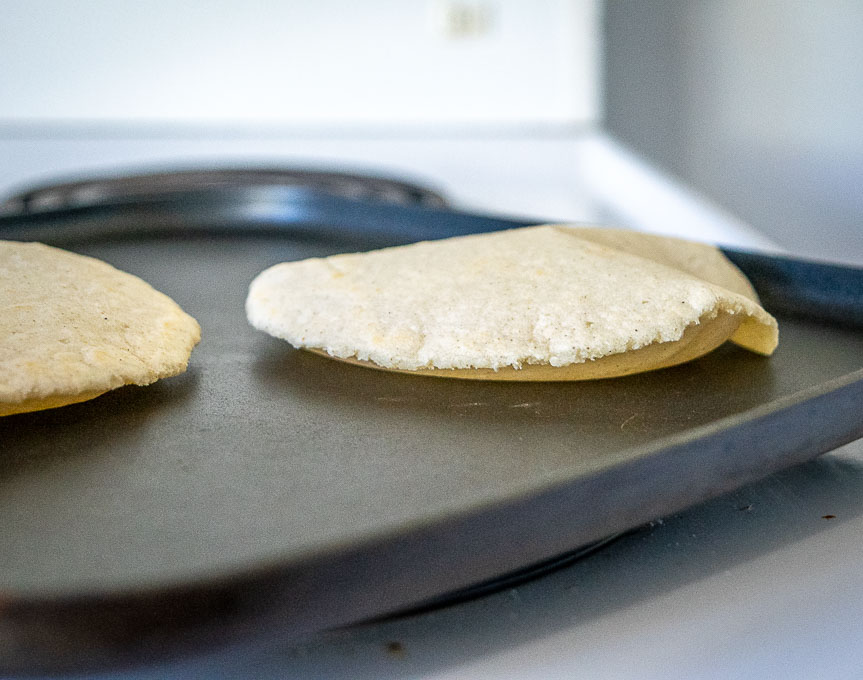
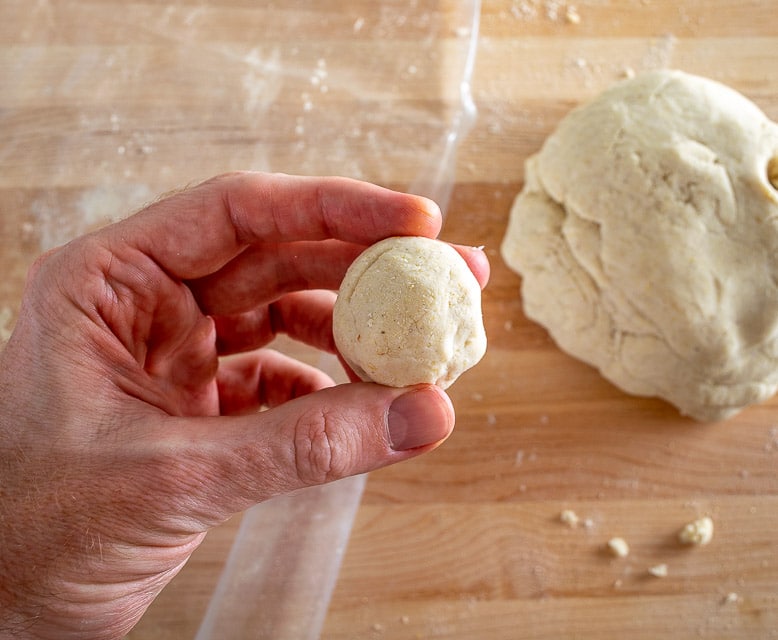
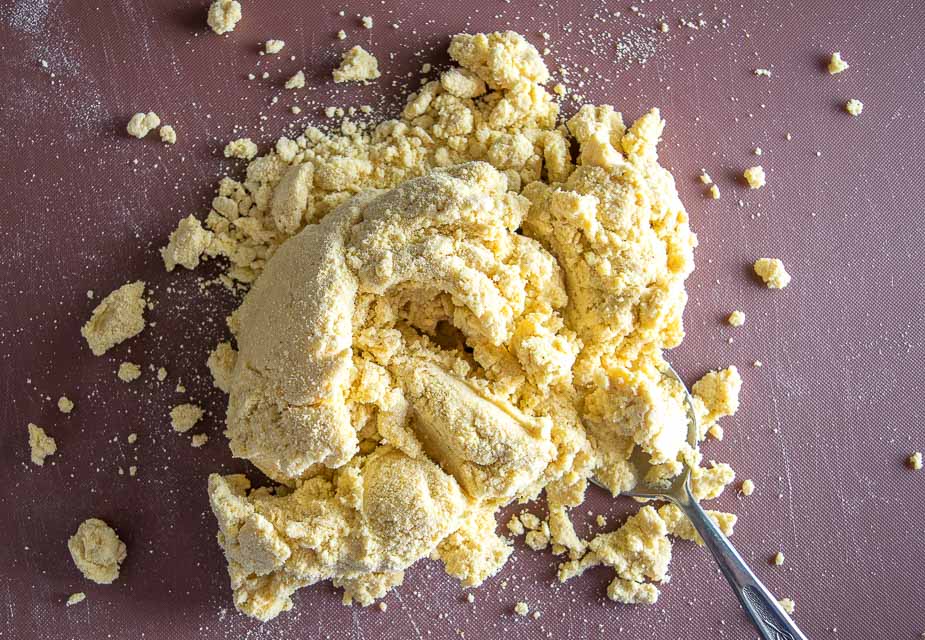
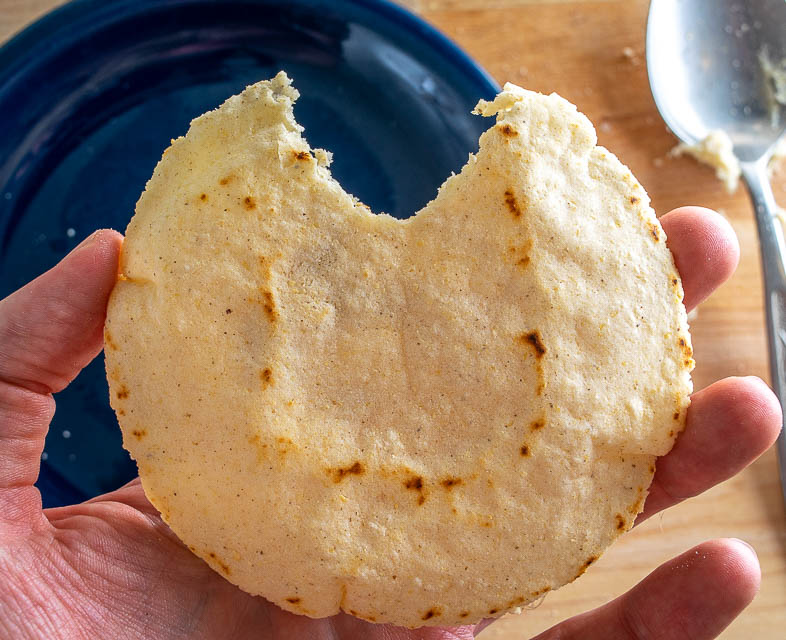
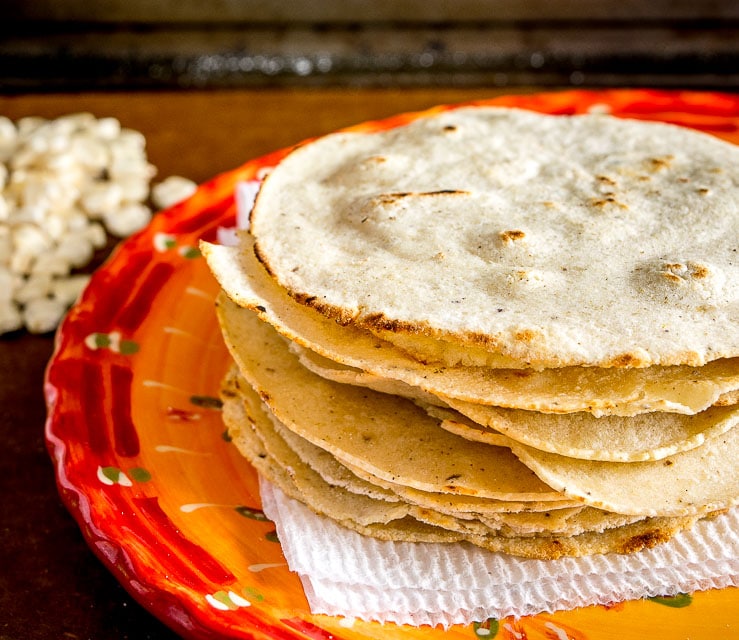
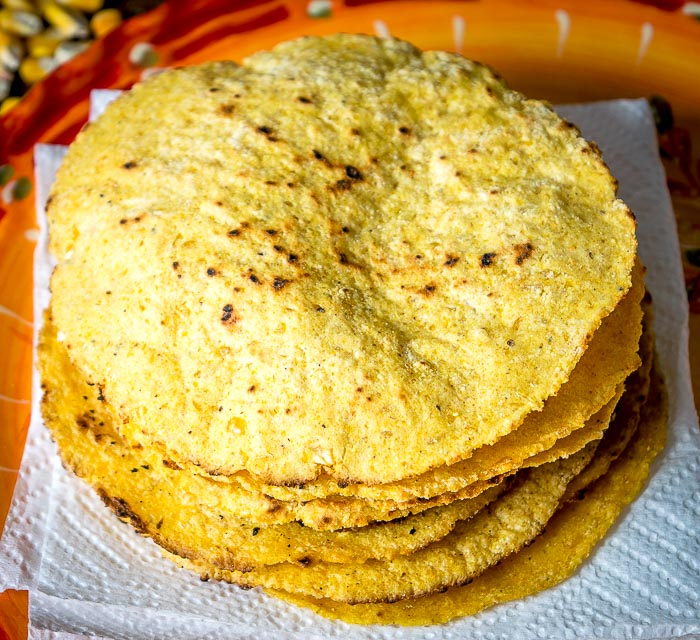
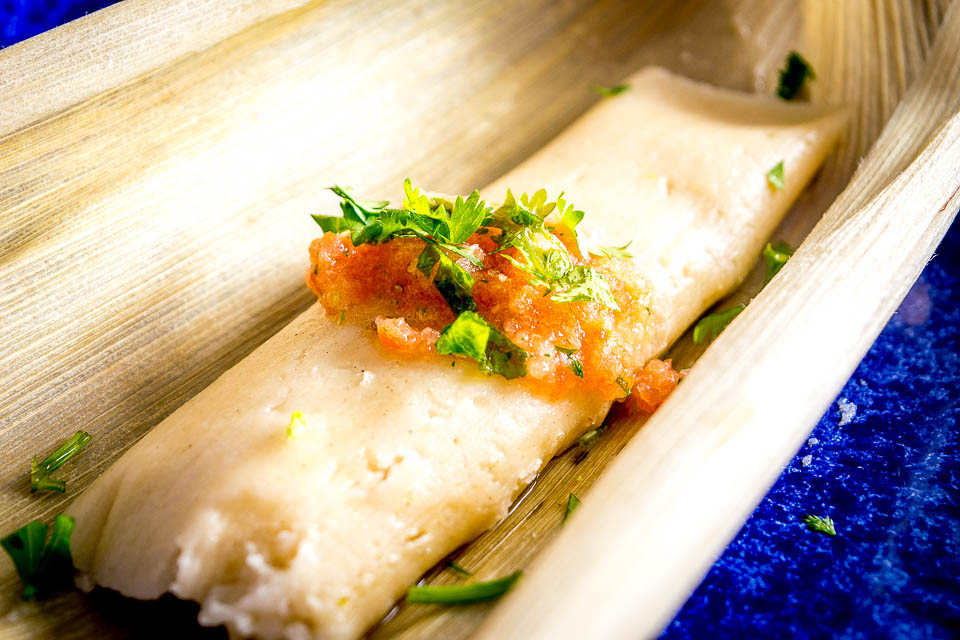
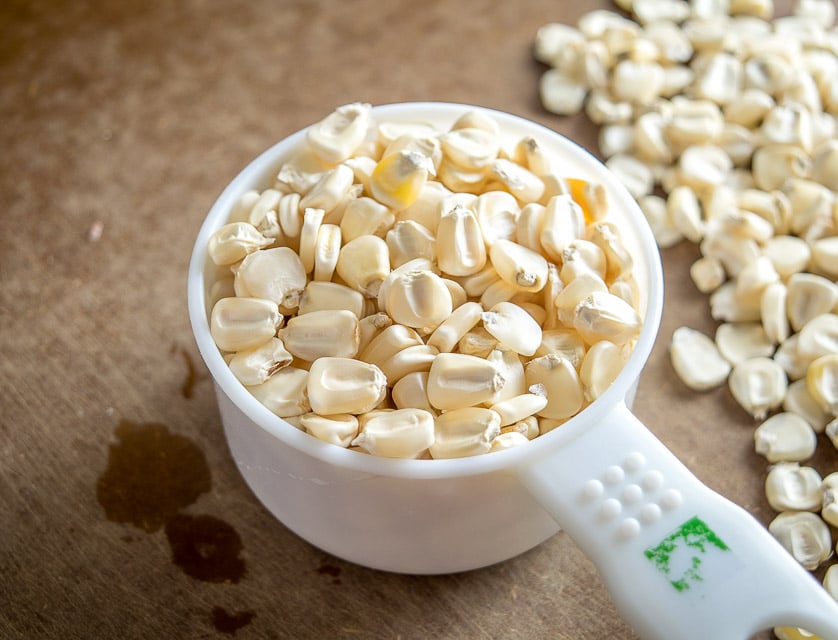
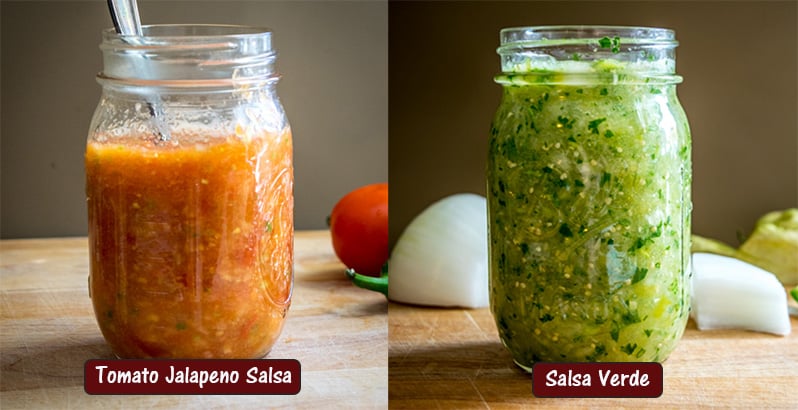
Jeneice
Followed the recioe exactly and they were perfect!
Patrick
Ahh good news 🙂
K
Just made these tonight, and they are AMAZING!!! I used Maseca's Nixtamasa. What a fantastic rich corn flavor! I had no idea that making corn tortillas would be so easy! They are exponentially more flavorful than store bought and the best part is, I can control how much salt goes in them. Thank you so much for sharing the recipe and techniques!
Patrick
Ahh good news K, so glad you have discovered the joy of homemade tortillas 🙂 Cheers.
Ronda
Hi There!
I'm not a total stranger to making tortillas but I'm curious, can you use chicken broth instead of water when making corn tortillas? Or even half water and half broth? Just wondering if it would enhance the flavor.
PS: I love all your recipes, you help me get bonus points with my Mexican mother in law, and that's not easy to do! 😉
Patrick
Hey Ronda, glad to hear you are getting some bonus points! Yeah feel free to use stock when making tortillas -- I haven't tried that yet but I think it would work because stock seems to make everything taste better 🙂 Cheers.
Ronda
Thank you Patrick, I'll be making tortillas this weekend and will try them with chicken stock. Wish me luck!
Doreen
Hello,
Thank you for sharing this recipe. I look forward to trying it out. I have one question, if you do not mind. Are the tortillas soft so that they can be rolled to make wraps? Or how are they typically eaten?
Thank you in advance for your reply.
Cheers,
Doreen
Patrick
Hey Doreen! They are typically used for tacos, and I think they will be a little small for wraps. But you could consider flour tortillas for the wraps:
Homemade Flour Tortillas
Cheers.
Cat
I have a question. How long can you store masa harina? I purchased some in early 2023 and stored it in my refrigerator in a sealed ziplock bag. Made tortillas today and wasn’t happy with the results. Is it possible the flour is stale? The texture was still powdery and didn’t smell sour. So I’m not sure if I should toss it and buy new.
Thank you so much for sharing your knowledge and recipes.
Patrick
Hey Cat! Hmmm tough one, I just checked my bags of Bob's and the expiration date is less than a year after date of purchase. It's tough to say exactly because it does probably last a bit longer than the expiration date, but it sounds like you are probably testing the limits given that it's over a year old. There's also a chance that it would have lasted longer in a sealed container as the effectiveness of Ziplocs can vary. To summarize....prob toss it and buy new because homemade corn tortillas should always be awesome 🙂
Cat
♥️
Catherine Griffiths Scholze
This recipe teaches the technique of making corn tortillas and I find it to be very helpful for understanding what the dough needs to look and feel like to get a good result. I have used it twice now and have been very happy with the results! Highly recommend for anyone new to making tortillas.
Patrick
Thanks Catherine!